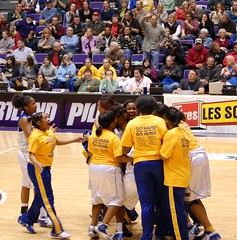History Lesson
by Steve, April 25th, 2012I’ve maintained a two-year public silence on Portland Public Schools, after devoting countless hours to speaking out and finally deciding to get my kids out of harm’s way. Not everybody has that option, of course, which is why recent events cause me such grief.
The school board’s decision to close two North Portland schools is deja vu all over again. Here’s a little history lesson for the board members who evidently don’t know — or don’t give a shit. (Dates are approximate; I don’t feel like looking them up. Feel free to leave corrections in comments.)
- 1982: Harriet Tubman Middle School founded as part of a comprehensive desegregation plan pushed by the Black United Front. Middle schools, you see, draw from a wider population area than K-8s, reduce segregation, and allow for more curriculum with less money. Who knew it could be so easy?
- 1990: Oregon voters pass Measure 5. Universal art, music and PE are cut in PPS. Schools with adequate enrollment and fundraising (i.e. rich schools) are able to maintain some of these “enrichments.”
- 1996: Oregon voters pass Measure 47, further limiting school funding.
- 1997: Oregon voters pass Measure 50, reiterating their desire to continue choking off school funding.
- Early 2000s: A student transfer lottery is instituted. Superintendent Vicki Phillips embraces a free market enrollment policy and encourages schools to compete with one another for enrollment. As Portland’s black neighborhoods gentrify and get whiter, their schools are drained of enrollment and funding as white students transfer out. Phillips also decides to close most middle schools in poor neighborhoods, and revert to the K-8 model that was done away with by the 1982 desegregation plan (and which costs more while delivering less). Tubman middle school is closed, and the Jefferson cluster is left with no middle school. Facing budget cuts, the Phillips administration closes many schools, especially in poor and minority neighborhoods, and the Neighborhood Schools Alliance rises up to oppose her. Future school board member Ruth Adkins emerges as a strong voice in defense of neighborhood schools. Jefferson, Madison, Roosevelt and Marshall High Schools are sliced up into rigidly divided “small schools” pushed by corporate philanthropists (notably the Gates foundation).
- 2007: As part of the Jefferson re-re-design into Gates “small schools,” Harriet Tubman is re-opened as the all-girls Young Women’s Leadership Academy.
- Late 2000s: Vicki Phillips departs for a job with Gates and is replaced by Carole Smith. It’s become painfully obvious that the conversion from middle schools to K-8s has suffered a catastrophic lack of planning. Schools like Humboldt, already hurting for enrollment, are unable to offer anything resembling a comprehensive middle grade program. The district’s response: these schools must increase enrollment. But who wants to send their kid to a school that offers so much less than other schools? The district ignores the writing on the wall and refuses to re-examine its ill-fated decision to abandon middle schools in poor neighborhoods.
- 2012: A majority on the school board, including erstwhile neighborhood schools advocate Ruth Adkins, votes to close Humboldt and Tubman due to low enrollment. Converting Tubman back to a comprehensive middle school and Jefferson K-8s back to K-5 is not even considered. Balancing enrollment (e.g. via reform of the transfer policy that drains enrollment from Humboldt) is also not considered. Rebuilding Whitaker Middle School (as was once promised, years ago) is definitely not considered. Apparently the current superintendent and school board are completely ignorant of the 1982 desegregation plan — not to mention completely unwilling to address the inequities wrought by their open transfer enrollment policy — and believe poor and minority students can learn better if we close their neighborhood schools.
This isn’t just about closing a couple more schools in North Portland. This is part and parcel of a continuing history of institutional racism in Portland Public Schools. Humboldt and the Young Women’s Leadership Academy were set up to fail several years ago. There was never a model in place to support a comprehensive middle grade program in K-8 schools, especially those with enrollment drained by the self-reinforcing death spiral of the open enrollment system (the majority of students in Humboldt’s catchment area — 57% — transfer out). And there was never a funding plan for the “small schools” model once the Gates grants ran out; the YWLA is the last one standing.
This week’s board vote was the inevitable outcome of bad leadership decisions over the past decade (ya can’t say we didn’t tell ya so), and official indifference to issues of race and poverty (even as the district makes much of its “equity” and racial sensitivity programs).
I realize it’s none of my damn business now, having moved out of the district two years ago in disgust. Except it’s everybody’s business how we educate our children, and it’s everybody’s responsibility to speak up about injustice when they see it taking place.
And this, my friends, is some serious injustice being dropped on the heads of North Portland’s children.










